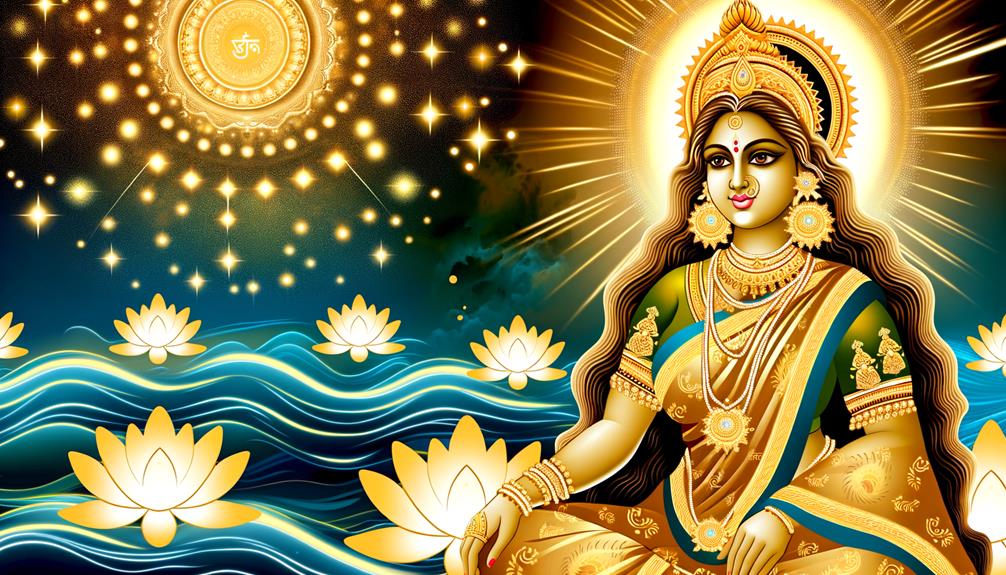Ambika Name Meaning in English
The name Ambika, rooted in ancient Sanskrit, signifies 'mother' or 'goddess.' Stemming from 'Amba,' which means 'mother,' the suffix '-ika' adds reverence and respect. In Hindu mythology, Ambika is an incarnation of the goddess Parvati, representing the divine feminine power, Shakti.
The name is culturally significant, often associated with nurturing and protection, and is celebrated in festivals like Navratri. It is frequently used in religious texts, literature, and rituals, highlighting its deep spiritual significance.
For in-depth insights into Ambika's historical and cultural resonance, additional exploration is recommended.

Key Takeaways
- Ambika means 'mother' or 'goddess' in ancient Sanskrit.
- It denotes a reverence-enhanced form of the word 'Amba', meaning 'mother'.
- Ambika is an incarnation of the goddess Parvati in Hindu mythology.
- The name symbolizes nurturing, protection, and divine feminine energy.
- It is widely used in religious texts, cultural practices, and modern naming conventions.
Etymology of Ambika
The name 'Ambika' is derived from the ancient Sanskrit language, where it signifies 'mother' or 'goddess,' reflecting its deep cultural and religious roots.
Etymologically, 'Ambika' stems from the word 'Amba,' which translates to 'mother' in Sanskrit. The suffix '-ika' serves to enhance its reverence, often used to denote divinity and respect. In Hindu tradition, Ambika is a popular name for the goddess Parvati, representing her role as the nurturing and motherly figure. In the Jain tradition, Ambika is also a title used for the goddess Saraswati. In the Islamic tradition, the Ameena name meaning is similar, as it also denotes motherhood and is often used as a name for women with a sense of reverence and respect.
Historically, this term has been utilized in various religious texts and practices, signifying a maternal figure of great veneration. The linguistic construction of 'Ambika' encapsulates both the nurturing essence of motherhood and the awe-inspiring stature of a goddess.
This dual connotation makes the name particularly significant in Indic cultures, where it transcends mere nomenclature to embody profound spiritual and cultural dimensions.
Mythological Connections
In Hindu mythology, Ambika is venerated as an incarnation of the goddess Parvati, embodying maternal strength and divine protection. As a manifestation of Shakti, Ambika represents the nurturing and protective aspects of the divine feminine. She is often depicted in scriptures and iconography as a powerful mother figure, safeguarding her devotees against evil forces.
References to Ambika can be found in ancient texts such as the Devi Mahatmya, where she plays a pivotal role in the cosmic battle against demonic entities. Her mythological narratives emphasize her role as a benevolent force, providing solace and security to those who seek her blessings. Ambika's mythological connections underscore her significance in the broader pantheon of Hindu deities.
Cultural Significance
Beyond her mythological significance, Ambika holds a profound place in the cultural fabric of regions where Hindu traditions prevail. Her name is imbued with rich cultural connotations that extend into various aspects of daily life, art, and community practices.
| Aspect | Description | Examples |
|---|---|---|
| Festivals | Celebrated during Navratri | Rituals, dances, prayers |
| Literature | Referenced in classical texts | Puranas, epics |
| Art | Depicted in traditional paintings and sculptures | Temple art, folk paintings |
| Social Practices | Symbol in marriage rituals | Blessings, ceremonies |
| Language | Commonly used in names and expressions | Personal names, idioms |
These elements illustrate Ambika's pervasive influence, underscoring her role as a cultural emblem in Hindu societies.
Spiritual Interpretations
Ambika's spiritual interpretations reveal multifaceted dimensions that resonate deeply within Hindu philosophy and devotional practices.
The name 'Ambika' is intrinsically linked to the divine feminine, specifically embodying the Goddess Durga, who symbolizes strength, protection, and motherhood.
In sacred texts, Ambika is revered as the mother of the universe, embodying the nurturing and protective aspects of the divine.
Her role extends beyond mere symbolism; she is invoked during rituals and prayers to seek guidance, strength, and protection against evil.
The name also underscores the interconnectedness of life and the divine cosmos, encapsulating the essence of divine nurturing and cosmic order.
Consequently, Ambika stands as a powerful representation of the divine feminine in Hindu spirituality.
Modern Usage
Today, the name Ambika is widely embraced in various cultural and social settings, reflecting its enduring importance and versatility. In contemporary times, this name is not only common in India but has also gained recognition globally. Its usage spans across different sectors, from academia to entertainment, highlighting its universal attraction.
| Country | Usage Context | Popularity |
|---|---|---|
| India | Traditional | High |
| United States | Multicultural | Moderate |
| United Kingdom | Diverse | Growing |
| Australia | Multicultural | Moderate |
The name's flexibility allows it to be used in both formal and informal settings, making it a preferred choice for parents seeking a name with deep cultural origins and modern relevance. Ambika's enduring charm guarantees its ongoing popularity and importance.
Conclusion
The name Ambika, rich in etymology and mythological connections, reverberates through cultural and spiritual domains, embodying profound significance.
This name, woven into the tapestry of tradition and modernity, stands as a beacon of divine feminine power and nurturing grace.
Its multifaceted interpretations and enduring usage reflect a timeless resonance, inviting contemplation and reverence.
Ambika encapsulates a heritage that transcends generations, offering a glimpse into the intricate interplay between language, culture, and spirituality.






